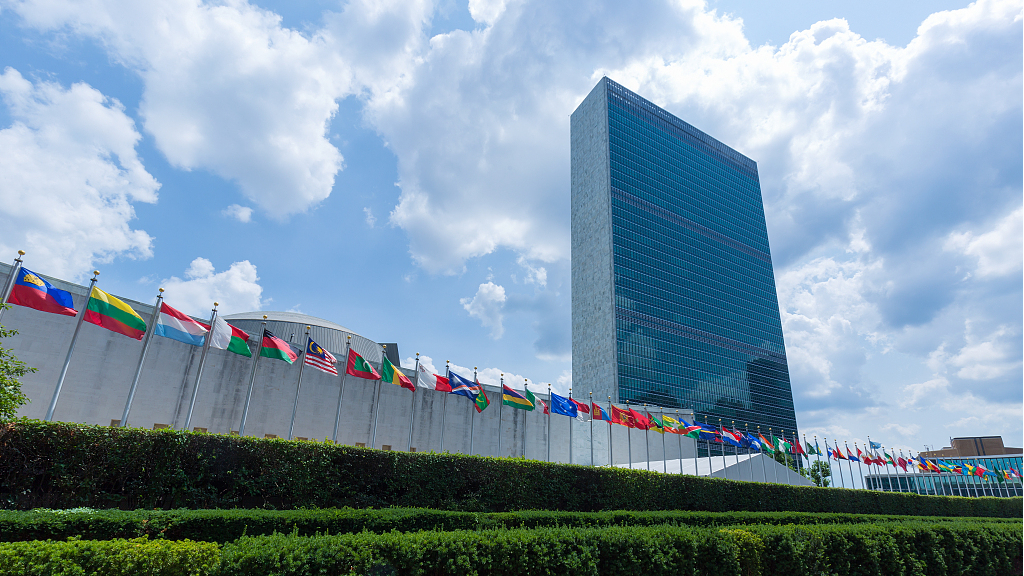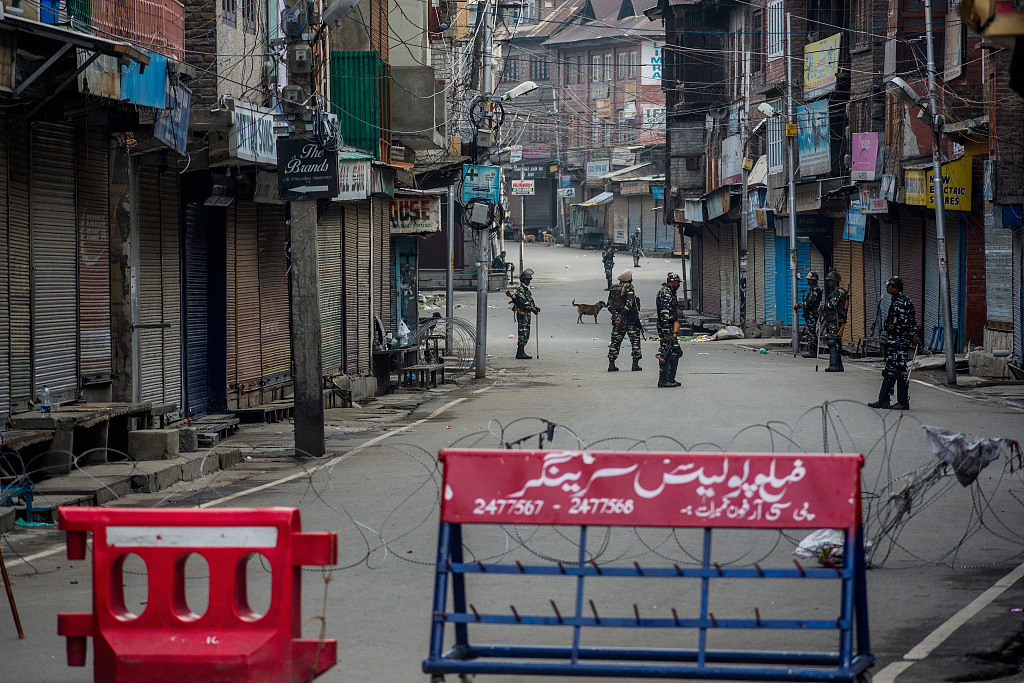

Editor's note: Rabi Sankar Bosu, an Indian freelance contributor to Chinese media outlets, writes about Chinese politics, social and cultural issues, and China-India relations with special interest on the Belt and Road Initiative. The article reflects the author's opinions, and not necessarily the views of CGTN.
The Narendra Modi-led Bharatiya Janata Party (BJP) government made a decision on August 5 to scrap Article 370 of the Indian Constitution and bifurcated India-administered parts of Jammu and Kashmir into two union territories – Jammu and Kashmir with a legislative assembly, and Ladakh without a legislature through a presidential order.
The United Nations Security Council (UNSC) held a closed-door meeting on Kashmir for the first time since August 16,1965 in New York.
The powerful 15-nation Security Council failed to reach a unanimous statement after the meeting. It is another blow to democracy in support of Kashmiri people as the Kashmir dispute has been under the UN's monitoring since 1948.
It should be noted that the resolution to revoke Article 370, which afforded special status to the Muslim-majority state Jammu and Kashmir, and the 2019 Jammu and Kashmir Re-organisation Bill were passed by both Houses of the Indian Parliament with a thumping majority on August 5 and 6 respectively. Indian President Ram Nath Kovind had formalized it by signing the Constitution Order on August 9.
With the abrogation of Article 370, the Hindu nationalist BJP may have fulfilled one of its long-pending political promises, but at the same time it can be said that it can never be a good advertisement for democracy in India. The basic question that divides the nation now is whether revoking Article 370 will bring peace and stability to the log-disputed Kashmir Valley.
The revocations of Articles 370 and 35(A) have earned strong criticism from most of India's mainstream political parties, the people of Kashmir, and its two close neighbors, Pakistan and China.
The opposition parties slammed the government for dividing Jammu and Kashmir without consulting all stakeholders, including the people of the Valley while criticizing the guillotining of Article 370 as "murder of democracy", "unabashed majoritarianism", "the trampling of fundamental rights of Kashmiris", etc.
But what is more surprising is that the permanent five members of the Security Council— the U.S., Britain, France, Russia and China have miserably failed to put an end to India's present government's highhandedness in the Kashmir Valley which is now reeling under chaos.

Indian government forces stand guard in the deserted city center during India's Independence day celebrations in Srinagar, the summer capital of Indian administered part of Kashmir, August 15, 2019. /VCG Photo
Notably, the long-standing Kashmir problem has been at the UNSC since 1948 following the outbreak of the first war between India and Pakistan. The UN passed a resolution imposing an immediate ceasefire between India and Pakistan while allowing Kashmiris to decide their future for themselves under the aegis of the UN but India has never implemented the resolution.
Over the seven decades, the Kashmir Valley has only seen turmoil, terrorism and bloodshed due to the self-interested Kashmir policy adopted by two nuclear-armed South Asian neighbors, as well as the UN's persistent failure to redress the Kashmir dispute. Notably, the territorial dispute over the region involves three neighbors – India, Pakistan and China.
However, being worried about the Modi government's recent move of turning Kashmir dispute into a strictly "internal issue", Pakistan's Imran Khan government has raised strong objections to Indian actions, downgrading diplomatic relations with India, and put the Kashmir issue with renewed vigor to the international bodies such as the UNSC and the Organization of Islamic Cooperation in support of Kashmir.
Even Pakistani Foreign Minister Shah Mehmood Qureshi paid an unscheduled visit to Beijing on August 9 and sought China's help against India's unilateral decision for revoking the constitutional article and human rights abuses in the region at the UNSC.
According to news reports, the UNSC had declined a request from Pakistan on August 13 to hold a full-fledged open session on Kashmir, instead scheduling a closed-door consultative meeting on Kashmir at China's support on August 16.
But in the absence of a joint statement after the meeting, it seemed the UNSC is split over taking a concrete resolution about the Kashmir issue which is obvious in the high-decibel statements of the envoys from India and Pakistan to the UN.

A Kashmiri familiy walks past a blockade put up by residents to prevent Indian security force personnel from entering their neighborhood during restrictions, after the scrapping of the special constitutional status for Kashmir by the Indian government, in Srinagar, August 20, 2019. /VCG Photo
On August 16, CNN reported that two of the five permanent UNSC members and a major Western power thwarted the UN organ from issuing a press statement condemning the Indian government for changing the status of Jammu and Kashmir.
Quoting UN diplomats with knowledge of the Council workings, the CNN report said: "France, Germany and the United States objected to language that might have broadened the issue beyond the possibility of future bilateral talks between India and Pakistan."
However, it is good to hear that after the meeting, China's permanent representative to the UN, Zhang Jun urged the two neighbors to settle their differences peacefully and "discard the zero-sum game mentality."
"We call upon relevant parties to exercise peace and not to take actions that will aggravate tensions," he said, according to a UN news service report.
On the other hand, speaking on behalf of the Indian government, India's Envoy to the UN, Syed Akbaruddin, said that "our national position was, and remains, that matters related to Article 370 of the Indian Constitution, are entirely an internal matter of India", adding that India is committed to the principle "that all issues between India and Pakistan, as well as India and any other country, will be resolved bilaterally, peacefully, and in a manner that behooves normal inter-state relations between countries."
From Pakistan's perspective, it can be said that the UN Kashmir talks is a diplomatic win for Pakistan as it finally managed to "raise the voice of the Kashmiri people at the Security Council".
Judging by the tenor of the India's Ambassador's statement, it can be said that as a democratic country, India should thus be committed to the principles of dialogue and peace with Pakistan for the greater interest of the people in Jammu and Kashmir in the light of the 1972 Simla agreement.
At the same time, the UNSC should have come forward to sitting the two countries together to redress the 70-year old Kashmir conflict without adopting rhetoric of politics.
If dialogue does not take place, the Kashmir issue will never be resolved. Kashmiri people's hearts cannot be won with the military force. Peace is only possible if India, Pakistan and Kashmir sit down and talk to each other.
(If you want to contribute and have specific expertise, please contact us at opinions@cgtn.com.)

Copyright © 2018 CGTN. Beijing ICP prepared NO.16065310-3
Copyright © 2018 CGTN. Beijing ICP prepared NO.16065310-3